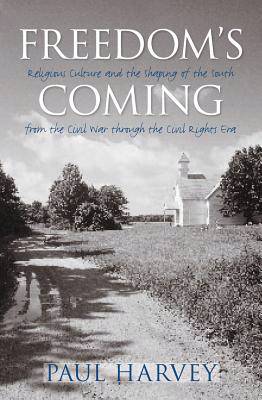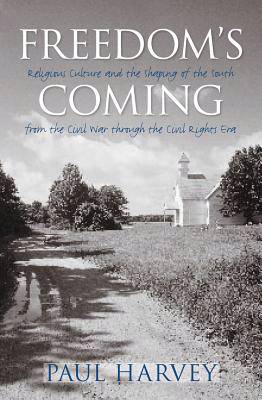
- Retrait gratuit dans votre magasin Club
- 7.000.000 titres dans notre catalogue
- Payer en toute sécurité
- Toujours un magasin près de chez vous
- Retrait gratuit dans votre magasin Club
- 7.000.0000 titres dans notre catalogue
- Payer en toute sécurité
- Toujours un magasin près de chez vous
Freedom's Coming
Religious Culture and the Shaping of the South from the Civil War through the Civil Rights Era
Paul Harvey
Livre broché | Anglais
50,45 €
+ 100 points
Description
In a sweeping analysis of religion in the post-Civil War and twentieth-century South, Freedom's Coming puts race and culture at the center, describing southern Protestant cultures as both priestly and prophetic: as southern formal theology sanctified dominant political and social hierarchies, evangelical belief and practice subtly undermined them. The seeds of subversion, Paul Harvey argues, were embedded in the passionate individualism, exuberant expressive forms, and profound faith of believers in the region.
Harvey explains how black and white religious folk within and outside of mainstream religious groups formed a southern "evangelical counterculture" of Christian interracialism that challenged the theologically grounded racism pervasive among white southerners and ultimately helped to end Jim Crow in the South. Moving from the folk theology of segregation to the women who organized the Montgomery bus boycott, from the hymn-inspired freedom songs of the 1960s to the influence of black Pentecostal preachers on Elvis Presley, Harvey deploys cultural history in fresh and innovative ways and fills a decades-old need for a comprehensive history of Protestant religion and its relationship to the central question of race in the South for the postbellum and twentieth-century period.
In a sweeping analysis of religion in the post-Civil War and twentieth-century South, Freedom's Coming puts race and culture at the center, describing southern Protestant cultures as both priestly and prophetic: as southern formal theology sanctified dominant political and social hierarchies, evangelical belief and practice subtly undermined them. Harvey explains how black and white religious folk within and outside of mainstream religious groups formed a southern "evangelical counterculture" of Christian interracialism that challenged the theologically grounded racism pervasive among white southerners and ultimately helped to end Jim Crow in the South.
Harvey explains how black and white religious folk within and outside of mainstream religious groups formed a southern "evangelical counterculture" of Christian interracialism that challenged the theologically grounded racism pervasive among white southerners and ultimately helped to end Jim Crow in the South. Moving from the folk theology of segregation to the women who organized the Montgomery bus boycott, from the hymn-inspired freedom songs of the 1960s to the influence of black Pentecostal preachers on Elvis Presley, Harvey deploys cultural history in fresh and innovative ways and fills a decades-old need for a comprehensive history of Protestant religion and its relationship to the central question of race in the South for the postbellum and twentieth-century period.
In a sweeping analysis of religion in the post-Civil War and twentieth-century South, Freedom's Coming puts race and culture at the center, describing southern Protestant cultures as both priestly and prophetic: as southern formal theology sanctified dominant political and social hierarchies, evangelical belief and practice subtly undermined them. Harvey explains how black and white religious folk within and outside of mainstream religious groups formed a southern "evangelical counterculture" of Christian interracialism that challenged the theologically grounded racism pervasive among white southerners and ultimately helped to end Jim Crow in the South.
Spécifications
Parties prenantes
- Auteur(s) :
- Editeur:
Contenu
- Nombre de pages :
- 360
- Langue:
- Anglais
Caractéristiques
- EAN:
- 9780807858141
- Date de parution :
- 26-02-07
- Format:
- Livre broché
- Format numérique:
- Trade paperback (VS)
- Dimensions :
- 164 mm x 228 mm
- Poids :
- 485 g

Les avis
Nous publions uniquement les avis qui respectent les conditions requises. Consultez nos conditions pour les avis.






